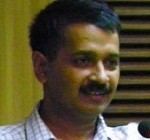What do we know about the Aam Aadmi Party’s (AAP) policies beyond its anti-corruption agenda?
Very little; but the party has appointed several experts to committees to develop policies that will affect the citizen and the country. An assessment of these will be valuable should AAP decide to enter the 2014 national elections and play a larger role in public life.
Extrapolating from AAP’s manifesto, Arvind Kejriwal’s book Swaraj, and various press interviews, Gateway House has set out to interpret what could be AAP’s national manifesto.
The party grew out of the anti-corruption movement, so expect the thread of transparency across-the-board will run through all policies.
On Delhi: clear focus and stated outcomes (www.aamaadmiparty.org)
- Electricity: Reduce consumers’ electricity expenditure by 50% by ordering an audit of discoms, rectifying inflated bills, having bills checked by independent agencies. Incentives and subsidies to provide 20% of Delhi’s electricity needs through solar energy in the next ten years.
- Water: Up to 700 litres of water, per day, free for households. AAP opposed to privatisation of Delhi Jal Board; committed to public provision of water to all.
- Jobs: Low-interest loans to young entrepreneurs
- Traders: Simplify VAT; opposed to FDI in retail
- Labour: Eliminate contract jobs for work required for 365 days a year; ensure implementation of minimum wages
- Unorganised sector: Social security for unorganised sector; regulate wages and working hours of domestic workers; improve working condition of rag-pickers; licenses and fixed locations for street vendors
On India: Some committees, some extrapolation
- Governance: Expect anti-corruption as the common minimum theme. Immediate passing of national Lokpal Bill to address political and bureaucratic corruption, caste-related issues in rural areas (Swaraj, pg 111), corporate governance. Devolution of financial and executive powers to gram sabha (rural) and mohalla sabha (urban).
- Economy: Committees to deal with economic decentralization (financial and executive powers to gram and mohalla sabhas); develop macroeconomic policies including tackling inflation, job creation, foreign direct investment, taxation & black economy, industrial policy (including small scale industry), agriculture, including land reform. Committee members: Arun Kumar (Prof. Public Finance, JNU), Aseem Srivastava (environmental economist), Avinash Alok, Pravin Singh, Prithvi Reddy (educationist), Rakesh Sinha, S. P. Sethi (Prof. Management, Univ. of Texas).
- Foreign Policy: Expect a focus on our neighbourhood, especially an effort to improve relations with Pakistan. Extrapolated from appointment of Admiral Ramdas (Chief of Staff, Indian Navy), a vocal proponent of good relations with neighbours especially Pakistan. In an Economic Times interview, Arvind Kejriwal said AAP would “deal with every country on equal terms.” Also on the committee: Madhur Bhaduri (IFS Retd.) David Thomas, Kishore Asthana (founder member, AAP), M. Badrul Alam (head, political science, Jamia Milia Islamia Univ.).
- Security: No stated policy or committee. Given AAP focus on corruption, anticipate clean procurement of defence and other large scale equipment.
- Social: Focus on unorganized, small scale sector, caste injustice oversight by Lokpal (Swaraj, pg. 95). Gender: stated gender equality in party organization but in the Delhi election, AAP fielded only six women candidates, about the same as the Congress and BJP.
This blog was exclusively written for Gateway House: Indian Council on Global Relations. You can read more exclusive content here.
For interview requests with the author, or for permission to republish, please contact outreach@gatewayhouse.
© Copyright 2013 Gateway House: Indian Council on Global Relations. All rights reserved. Any unauthorized copying or reproduction is strictly prohibited


